Toxic Secrets

When you drive down the streets of your neighborhood, do you ever wonder what's going on inside other people's houses? What really goes on behind closed doors?
Ronda is one of millions of Americans living a secret life, and her neighbors don't suspect a thing.
"My secret is I have obsessive-compulsive disorder," Ronda says. "I have taken it to the extreme that it affects not only myself, but also my family, my children. We live in a home that cannot get dirty."
Ronda's extreme fear of germs and dirt controls every aspect of her life. She spends hours every day scrubbing, mopping and vacuuming her already immaculate house. Ronda says she maintains a constant vigil against anyone touching and "infecting" her things.
Ronda's most rigid rule? Once she's bathed and in bed, her side of the mattress is off limits. "My bed is my bed," she says. "You're not going to touch it. You're not going to climb on it. You're not going to sit on it. You're not even going to go near it because it's my side of the bed."
It's not just possessions Ronda tries to protect from contamination. After her bath, no one is allowed to touch her for any reason...not even her husband and children.
Ronda is one of millions of Americans living a secret life, and her neighbors don't suspect a thing.
"My secret is I have obsessive-compulsive disorder," Ronda says. "I have taken it to the extreme that it affects not only myself, but also my family, my children. We live in a home that cannot get dirty."
Ronda's extreme fear of germs and dirt controls every aspect of her life. She spends hours every day scrubbing, mopping and vacuuming her already immaculate house. Ronda says she maintains a constant vigil against anyone touching and "infecting" her things.
Ronda's most rigid rule? Once she's bathed and in bed, her side of the mattress is off limits. "My bed is my bed," she says. "You're not going to touch it. You're not going to climb on it. You're not going to sit on it. You're not even going to go near it because it's my side of the bed."
It's not just possessions Ronda tries to protect from contamination. After her bath, no one is allowed to touch her for any reason...not even her husband and children.
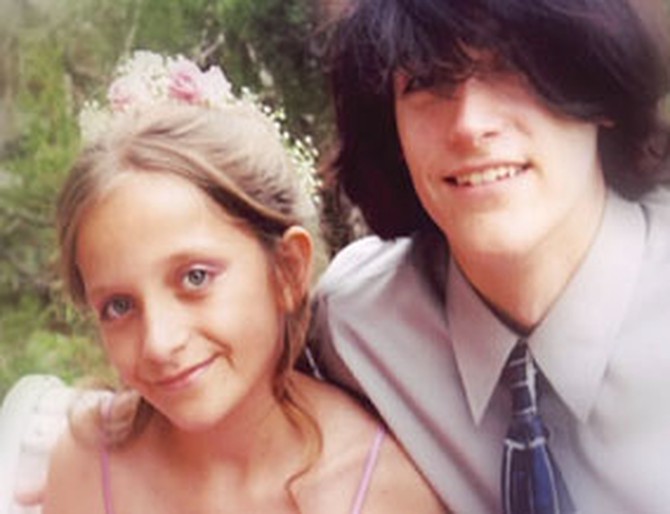
Ronda insists that her son, Grayson, and daughter, Michaela, follow her strict rules of cleanliness.
"Mom's rules [range from] normal things like take off your shoes when you come in, [to] shower constantly," says Grayson. Michaela says she has to wash her hands—and sometimes even shower—before she can use her mother's computer. Ronda even gave away the family pet, a dog named Delilah, because she couldn't tolerate her shedding.
Despite their best efforts to live by her rules, Ronda's family is seldom clean enough for her. "I can't bring myself to hold my daughter's hand, so I will hold her by the wrist," Ronda says. "I wish I could change, but I don't know how."
"She doesn't hug me," Michaela says, "but I wish she would. She probably just thinks I'm dirty." Grayson also misses physical affection from his mom. "Sometimes," he says, "you need a hug."
"Mom's rules [range from] normal things like take off your shoes when you come in, [to] shower constantly," says Grayson. Michaela says she has to wash her hands—and sometimes even shower—before she can use her mother's computer. Ronda even gave away the family pet, a dog named Delilah, because she couldn't tolerate her shedding.
Despite their best efforts to live by her rules, Ronda's family is seldom clean enough for her. "I can't bring myself to hold my daughter's hand, so I will hold her by the wrist," Ronda says. "I wish I could change, but I don't know how."
"She doesn't hug me," Michaela says, "but I wish she would. She probably just thinks I'm dirty." Grayson also misses physical affection from his mom. "Sometimes," he says, "you need a hug."

Mike, Ronda’s husband, says he has managed to cope and "get by," but living with Ronda's secret is physically and emotionally exhausting. "I am so tired," he says. "I'm just drained. I cook, I clean, and when the kids get sick, I'm the doctor. I come home and I'm frantically cleaning up the sink and putting dishes in the dishwasher and wiping down the counters so when she does get home, she doesn't go ballistic."
Mike also says Ronda's aversion to being touched is killing their intimacy. "It's been over three months [since we had sex]. ... There's so much that I feel like I'm missing out on with her."
Mike also says Ronda's aversion to being touched is killing their intimacy. "It's been over three months [since we had sex]. ... There's so much that I feel like I'm missing out on with her."
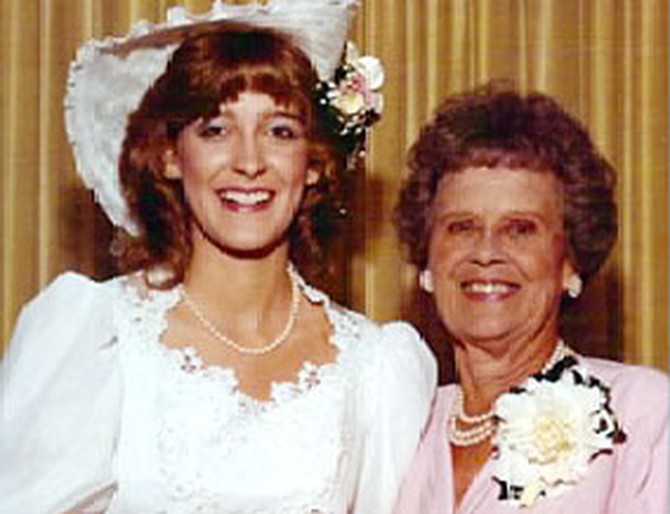
Ronda says her obsessive-compulsive behavior started when she and her husband purchased their first home. She believes she probably inherited the condition from her grandmother, who owned a beautiful, immaculate home but refused to live it in for fear of getting it dirty. Instead, every day for 14 years, Ronda's grandmother lived in a shack in the backyard.
"I spent a lot of time with her in the little room," Ronda says. "There was no bathroom. There was a shower that she had my grandfather hook up outside. ... If it was winter, it was cold." Instead of an indoor bathroom or even an outhouse, their toilet was an area of ground spread with gravel.
"When they sold their house, it was a brand new home," Ronda says. "It was 14 years old, but if you opened the oven, you'd see the warranty inside the plastic. She didn't want anything to be used. ... I know how she felt."
"I spent a lot of time with her in the little room," Ronda says. "There was no bathroom. There was a shower that she had my grandfather hook up outside. ... If it was winter, it was cold." Instead of an indoor bathroom or even an outhouse, their toilet was an area of ground spread with gravel.
"When they sold their house, it was a brand new home," Ronda says. "It was 14 years old, but if you opened the oven, you'd see the warranty inside the plastic. She didn't want anything to be used. ... I know how she felt."

Ronda says she's tried seeking help, including sessions of behavior modification—a therapy in which patients are exposed to triggers and they learn to control their response—but she says she found the treatment too uncomfortable to continue.
Dr. Tara Fields, a licensed marriage and family therapist with expertise in addictive behavior, says that Ronda is choosing to put her secret compulsion before her family.
"I can tell you for sure that this is curable," Dr. Tara says. "Until you make the decision that the pain that you're in and your family is in and your husband is in—and even that little girl inside of you that never got nurtured—can't be any worse than what you'd have to experience by doing some of those [behavior modification] exercises and making a commitment to treatment."
Dr. Tara says Mike is "feeding" Ronda's obsessive compulsive disorder and can help her get better by not facilitating her behavior. "He's absolutely enabled her out of love," Dr. Tara says. "Making excuses [and] protecting her from her fears is really just allowing the behavior to continue."
Dr. Tara Fields, a licensed marriage and family therapist with expertise in addictive behavior, says that Ronda is choosing to put her secret compulsion before her family.
"I can tell you for sure that this is curable," Dr. Tara says. "Until you make the decision that the pain that you're in and your family is in and your husband is in—and even that little girl inside of you that never got nurtured—can't be any worse than what you'd have to experience by doing some of those [behavior modification] exercises and making a commitment to treatment."
Dr. Tara says Mike is "feeding" Ronda's obsessive compulsive disorder and can help her get better by not facilitating her behavior. "He's absolutely enabled her out of love," Dr. Tara says. "Making excuses [and] protecting her from her fears is really just allowing the behavior to continue."

Twenty-four-year-old Salina appears to have it all together. She's smart, attractive, has a nice house, car and a great husband—but what she's hiding is killing her. For 11 years she's suffered from bulimia, a disease that causes esophagus tears, stomach ruptures, heart disease and death.
Salina gorges herself on all-you-can-eat buffets and says she gets a high from the cycle of binging and purging. "It's what makes me feel like I'm on top of the world," she says. She destroys restaurant receipts so that her husband, Neal, doesn't see the evidence of her binging. She also hides her purging from him. Neal believes she only does it two to three times a week, but the ugly truth is that she secretly purges two to three times a day.
Salina gorges herself on all-you-can-eat buffets and says she gets a high from the cycle of binging and purging. "It's what makes me feel like I'm on top of the world," she says. She destroys restaurant receipts so that her husband, Neal, doesn't see the evidence of her binging. She also hides her purging from him. Neal believes she only does it two to three times a week, but the ugly truth is that she secretly purges two to three times a day.
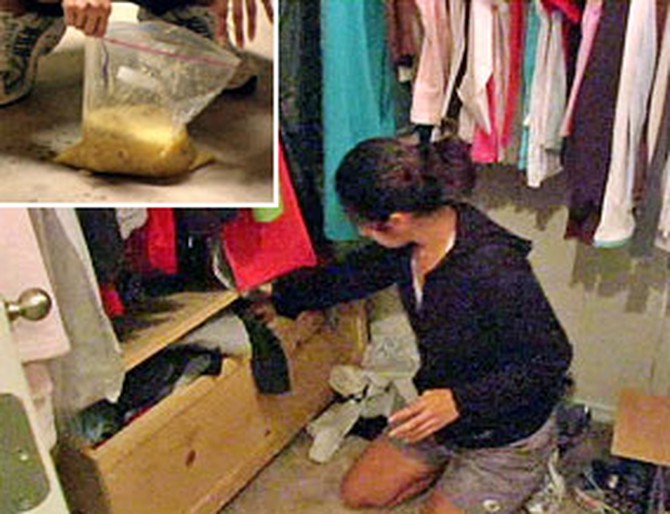
Salina's secret is literally "in the closet." She vomits into plastic bags, which she hides behind a chest in the back of her closet.
"I don't like to do it in the toilet," she says. "I'm terrified that one day the toilet's going to get backed up and that would be gross."
Once a week she takes her collection to a dumpster, throwing out between 14- and 21-gallon bags of vomit each week.
"I don't like to do it in the toilet," she says. "I'm terrified that one day the toilet's going to get backed up and that would be gross."
Once a week she takes her collection to a dumpster, throwing out between 14- and 21-gallon bags of vomit each week.
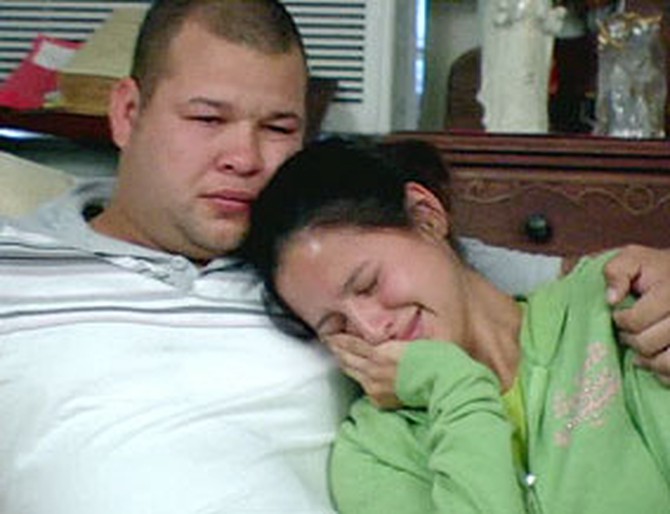
Salina thinks she's keeping her eating disorder a secret...but what she doesn't know is that her husband and family have had enough.
Neal says that watching his wife battle bulimia is heartbreaking. "The times that I have asked her about it, she's attacked me verbally," he says.
Salina's family stages a dramatic intervention to try to convince her to get help. "There are no more secrets," says Candy, the interventionist. "You cannot put up with this behavior anymore because you now know it isn't her. It's the disease of bulimia. It's going to end up killing her."
The intervention begins with her brother's emotional message. "I love you very much, but I won't let this disease affect you any longer," David says. "Every time I sit down to eat I wonder, are you eating? Are you going to throw up?"
Bulimia is destroying Salina's health as well as her marriage. "I want to have kids and live like a normal family...and I can't," Neal says. "I can't trust for you to carry my child and not be taking care of yourself."
Neal says that watching his wife battle bulimia is heartbreaking. "The times that I have asked her about it, she's attacked me verbally," he says.
Salina's family stages a dramatic intervention to try to convince her to get help. "There are no more secrets," says Candy, the interventionist. "You cannot put up with this behavior anymore because you now know it isn't her. It's the disease of bulimia. It's going to end up killing her."
The intervention begins with her brother's emotional message. "I love you very much, but I won't let this disease affect you any longer," David says. "Every time I sit down to eat I wonder, are you eating? Are you going to throw up?"
Bulimia is destroying Salina's health as well as her marriage. "I want to have kids and live like a normal family...and I can't," Neal says. "I can't trust for you to carry my child and not be taking care of yourself."

After successfully completing a 52-day inpatient treatment program, Salina says she's had the "urge to purge" only once in seven months. "I don't even want to go back to that," she says. "I just think it's disgusting. ... Just going into my closet every day is kind of like, 'Oh, my God, what did I do? How gross.'"
After years of hiding the severity of her disease from her husband, she's also working on rebuilding trust in her marriage. Neal says he was shocked to learn his wife was vomiting as many as three times a day. "[When I found out] I felt like, 'Man, how can I be so stupid?'" he says. "Even though I should trust her and know that she's [no longer binging and purging], I still watch."
Salina says she understands his motives, but Neal still feels like he betrayed his wife by exposing her deadly secret. "I did it because I love Salina, and I wanted to protect her," he says. "I didn't want her to be embarrassed. I didn't want her to feel like everybody's coming down on her."
After years of hiding the severity of her disease from her husband, she's also working on rebuilding trust in her marriage. Neal says he was shocked to learn his wife was vomiting as many as three times a day. "[When I found out] I felt like, 'Man, how can I be so stupid?'" he says. "Even though I should trust her and know that she's [no longer binging and purging], I still watch."
Salina says she understands his motives, but Neal still feels like he betrayed his wife by exposing her deadly secret. "I did it because I love Salina, and I wanted to protect her," he says. "I didn't want her to be embarrassed. I didn't want her to feel like everybody's coming down on her."

Dr. Tara, one of the interventionists featured on Intervention, the A&E series that followed Salina's battle with bulimia, has helped many people like Salina break their silence. She says that winning the battle over bulimia isn't as simple as people may think. Purging, she explains, gives bulimics a sort of "high" and becomes a stress-management technique.
"Many people don't realize that bulimia isn't just about, 'I don't want to ingest those calories and be fat,'" Dr. Tara says. "It's a process that helps you mood alter and reduce stress. ... In all the time that it takes to plan the binge, to hide the binge, you don't have to be connected to yourself—you don't have to feel."
Salina may have control over her disease, but she's not out of danger yet. Dr. Tara says the most important thing she can do to stay healthy is to keep going to therapy. How can she improve her marriage? Honesty is key, Dr. Tara says. "The way you build trust again is no secrets...no matter what."
"Many people don't realize that bulimia isn't just about, 'I don't want to ingest those calories and be fat,'" Dr. Tara says. "It's a process that helps you mood alter and reduce stress. ... In all the time that it takes to plan the binge, to hide the binge, you don't have to be connected to yourself—you don't have to feel."
Salina may have control over her disease, but she's not out of danger yet. Dr. Tara says the most important thing she can do to stay healthy is to keep going to therapy. How can she improve her marriage? Honesty is key, Dr. Tara says. "The way you build trust again is no secrets...no matter what."
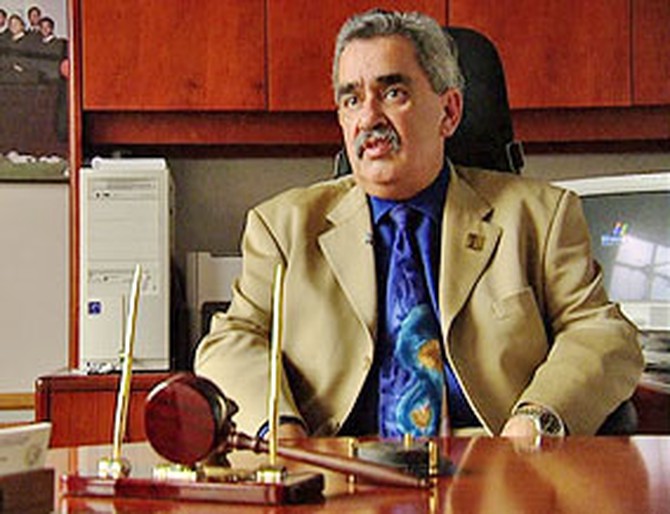
There's a dangerous secret that's destroying families in every city, town and community across America. Not even Oprah's neighborhood is safe.
In Santa Barbara, California, authorities are removing children from their homes in record numbers because their parents are addicted to crystal methamphetamine.
"Meth has become the new crack," Oprah says. "It's more dangerous because it's cheaper. And [it's] not just in the inner cities. It is the fastest growing drug addiction throughout this country."
Children's advocate Jennifer Mills says that Santa Barbara's foster care system is bursting at the seams. There are simply too many meth-addicted parents and too few foster homes to care for their children.
"I've seen an explosion, especially of methamphetamine abuse, in our community," says Rogelio Flores, a superior court judge in Santa Barbara. "Meth is an equal opportunity destroyer, so we see rich and poor, black and white, tall and short [addicts]."
In Santa Barbara, California, authorities are removing children from their homes in record numbers because their parents are addicted to crystal methamphetamine.
"Meth has become the new crack," Oprah says. "It's more dangerous because it's cheaper. And [it's] not just in the inner cities. It is the fastest growing drug addiction throughout this country."
Children's advocate Jennifer Mills says that Santa Barbara's foster care system is bursting at the seams. There are simply too many meth-addicted parents and too few foster homes to care for their children.
"I've seen an explosion, especially of methamphetamine abuse, in our community," says Rogelio Flores, a superior court judge in Santa Barbara. "Meth is an equal opportunity destroyer, so we see rich and poor, black and white, tall and short [addicts]."

Deborah, a loving wife and mother of three, made a life-shattering decision on her 33rd birthday that would tear her family apart and come close to killing her. Three years ago, she tried crystal meth for the first time and quickly became addicted.
At first, Deborah says she only used meth on the weekends. "I liked the way it made me feel," she says. "It opened up my mind." She also liked having extra energy to clean the house—and the loss of appetite led to weight loss.
Then the addiction took hold and she began using around the clock. "I got mean. I was ugly. I had a very cold heart," she says. "When I was high on meth, I couldn't handle being a mother...I couldn't handle being a wife. I ended up having affairs, and I tore my husband's heart out."
In and out of halfway houses, Deborah says she was hospitalized five times for attempted suicide. Doctors prescribed several medications, but she mixed the medicine with meth to get high. Her family stood by helplessly as the drug destroyed Deborah.
Julia, Deborah's daughter, says her mother's addiction made her feel "worthless."
"My children were the most important thing in my life," Deborah says. "But when I was high on meth, I left them. I abandoned them."
At first, Deborah says she only used meth on the weekends. "I liked the way it made me feel," she says. "It opened up my mind." She also liked having extra energy to clean the house—and the loss of appetite led to weight loss.
Then the addiction took hold and she began using around the clock. "I got mean. I was ugly. I had a very cold heart," she says. "When I was high on meth, I couldn't handle being a mother...I couldn't handle being a wife. I ended up having affairs, and I tore my husband's heart out."
In and out of halfway houses, Deborah says she was hospitalized five times for attempted suicide. Doctors prescribed several medications, but she mixed the medicine with meth to get high. Her family stood by helplessly as the drug destroyed Deborah.
Julia, Deborah's daughter, says her mother's addiction made her feel "worthless."
"My children were the most important thing in my life," Deborah says. "But when I was high on meth, I left them. I abandoned them."
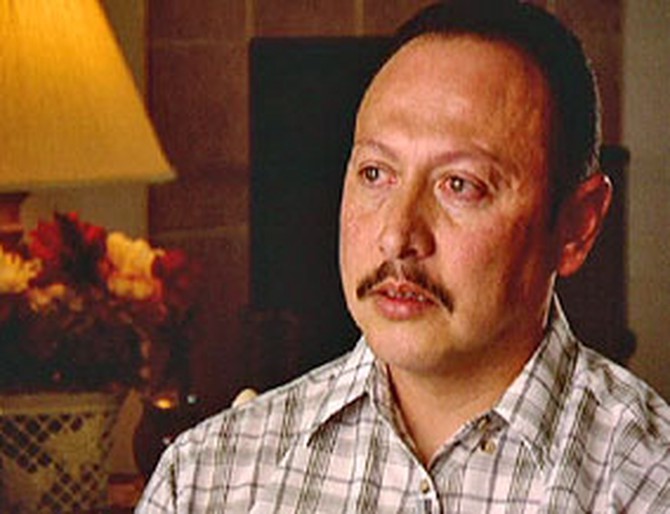
Marco, Deborah's husband, says his wife kept her addiction a secret by blaming her mood swings on stress, but he knew something wasn't right.
"I started seeing her lose more and more weight, her mood changed [and she] really couldn't function very well anymore...little by little withdrawing herself from the family, spending more time away," he says. "It was a dramatic change from who she was. She was no longer the woman I fell in love with."
Deborah denied that she was using drugs, but Marco confronted her and saw a side of his wife he'd never seen before. "One time she did get very violent with me," he says. "She attacked me. I had to literally lock myself in the bathroom."
Marco and his children finally got Deborah help, but she says treatment didn't work for her. "When I made the choice to quit the final time, I did it cold turkey," she says. Deborah has been sober for 15 months.
Dr. Tara says Marco did the most loving thing for his wife by taking a stand and not enabling her addiction. "You gave her a bottom line, which is 'I can't tolerate this anymore,'" she says. "It was really losing this relationship and the children that got her to get into treatment and to recover."
"I started seeing her lose more and more weight, her mood changed [and she] really couldn't function very well anymore...little by little withdrawing herself from the family, spending more time away," he says. "It was a dramatic change from who she was. She was no longer the woman I fell in love with."
Deborah denied that she was using drugs, but Marco confronted her and saw a side of his wife he'd never seen before. "One time she did get very violent with me," he says. "She attacked me. I had to literally lock myself in the bathroom."
Marco and his children finally got Deborah help, but she says treatment didn't work for her. "When I made the choice to quit the final time, I did it cold turkey," she says. Deborah has been sober for 15 months.
Dr. Tara says Marco did the most loving thing for his wife by taking a stand and not enabling her addiction. "You gave her a bottom line, which is 'I can't tolerate this anymore,'" she says. "It was really losing this relationship and the children that got her to get into treatment and to recover."

Meth can cause paranoia, hallucinations, rotten teeth, brain damage and even death, Dr. Tara says. So why are so many people trying it?
"Mothers, and women in general, are still pressured to do everything, to be perfect," Dr. Tara says. "The house is never perfect enough. Their body isn't perfect enough. So all of a sudden, they do this drug, and at least the first time, it seems like there's a lot of benefit. You don't feel like eating. You can get twice as many dishes done. ... But what they don't realize is if you continue doing it, you end up losing everything."
No matter what your deep, dark secret is, Dr. Tara urges you to tell someone. "We are as sick as our secrets," she says. "Whatever the original pain was that we were trying to medicate, whether it's through bulimia or obsessive compulsive behavior, the shame of hiding it and lying to our loved ones ... only makes the pain worse. ... The first step is realizing everybody feels pain. Everybody's got some secret. Speak to someone. One person."
"Mothers, and women in general, are still pressured to do everything, to be perfect," Dr. Tara says. "The house is never perfect enough. Their body isn't perfect enough. So all of a sudden, they do this drug, and at least the first time, it seems like there's a lot of benefit. You don't feel like eating. You can get twice as many dishes done. ... But what they don't realize is if you continue doing it, you end up losing everything."
No matter what your deep, dark secret is, Dr. Tara urges you to tell someone. "We are as sick as our secrets," she says. "Whatever the original pain was that we were trying to medicate, whether it's through bulimia or obsessive compulsive behavior, the shame of hiding it and lying to our loved ones ... only makes the pain worse. ... The first step is realizing everybody feels pain. Everybody's got some secret. Speak to someone. One person."
Published 10/19/2006

